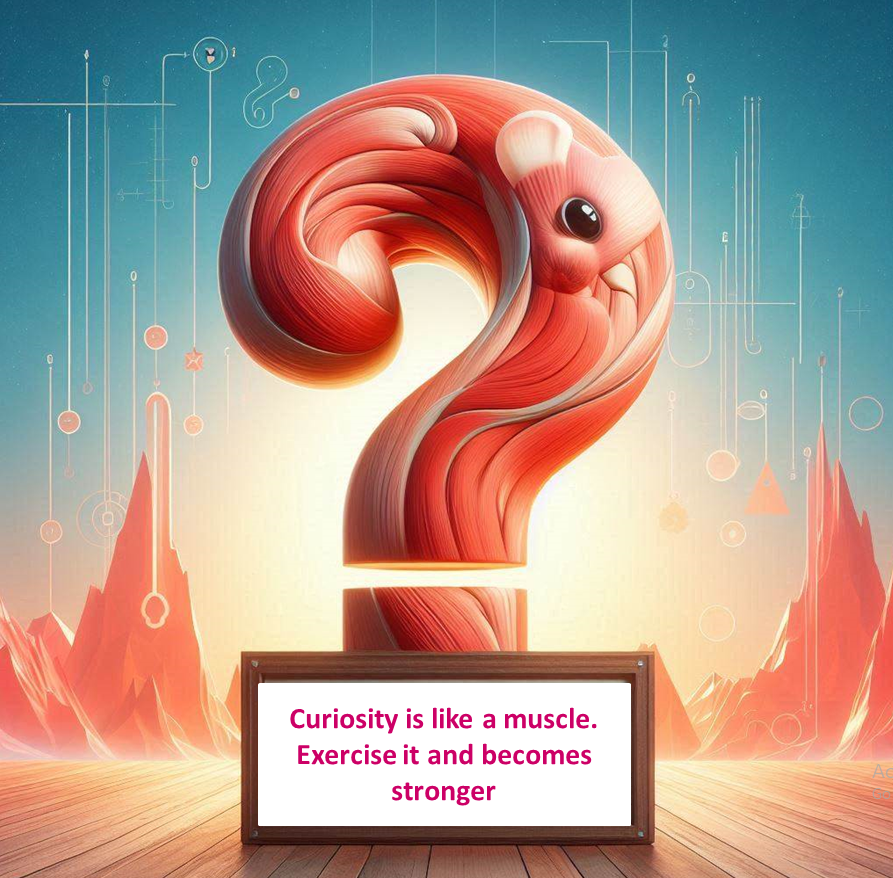Breakthroughs Begin with Your Super Power: Curiosity – Brand Management 45

One of the key drivers of my career success has been my innate curiosity and passion for continuous learning. To further hone this valuable trait, I recently began reading ‘Curiosity,’ a thought-provoking book published by Harvard Business Review on June 18, 2024. It is part of the HBR Emotional Intelligence series and is about how curiosity can be a powerful tool for leaders. The book explores how to develop curiosity using themes of emotional intelligence, such as empathy, self-awareness, and compassion. It includes advice and research from Tomas Chamorro-Premuzic, Marsha Acker, John Coleman, and Manbir Kaur.
Curiosity is a powerful tool for leaders. It can help you cope with complexity, learn from challenging conversations, build trust, and discover new perspectives. This book provides the expert research and advice you need to break free of your assumptions, strengthen your relationships, and see the world differently.
I am sharing my learning’s from this book with you.
What is Curiosity?
As a fresh brand manager or field sales manager, you might think your education has given you all the tools you need. But there’s one vital skill that can set you apart and drive your career forward: curiosity.
Let’s explore why curiosity matters and how you can cultivate it to excel in your role.
At its core, curiosity is the desire to learn, understand, and explore. It’s that itch to know more, to ask “why” and “how,” and to seek out new information and experiences. Curiosity drives innovation, problem-solving, and personal growth. Curiosity is what gives you the intellectual edge to move forward!
The Curiosity Quotient (CQ) is a measure of a person’s hunger for knowledge and willingness to learn. Just like IQ (Intelligence Quotient) and EQ (Emotional Quotient), CQ plays a crucial role in professional success. A high CQ can help you adapt to new situations, think creatively, and build stronger relationships with colleagues and customers.
Your curiosity quotient can be measured. A pharmaceutical company Merck has developed an index to measure your CQ – The Merck Curiosity Index. Besides you also have the Curiosity and Exploration Inventory-II (CEI-II) developed by Todd Kashdan, The Five-Dimensional Curiosity Scale: Created by Jordan Litman, and the Curiosity Index: Developed by Melbourne Business School.
Why Curiosity Matters After B-School
You’ve learned a lot in business school, but the business world is always changing. New technologies, market trends, and consumer behaviors emerge constantly. Curiosity helps you:
1. Stay updated: By actively seeking new information, you’ll keep your skills and knowledge fresh.
2. Spot opportunities: A curious mind is more likely to notice patterns and potential innovations.
3. Build relationships: Showing genuine interest in others helps create stronger connections with team members and clients.
4. Solve problems creatively: Curiosity leads you to explore different angles and find unique solutions.
5. Adapt to change: When you’re curious, you’re more open to new ideas and better equipped to handle shifts in the market.
Curiosity in Critical Thinking and Analysis
Curiosity is the fuel that powers critical thinking and analysis. Here’s how:
1. Asking better questions: Curiosity prompts you to dig deeper and ask more insightful questions, leading to better analysis.
2. Challenging assumptions: A curious mind is more likely to question the status quo and explore alternative viewpoints.
3. Gathering diverse information: Curiosity drives you to seek out various sources, resulting in a more comprehensive analysis.
4. Making connections: By exploring different areas, you can draw unexpected links between ideas, leading to innovative solutions.
5. Continuous improvement: Curiosity pushes you to refine your thinking and always look for ways to enhance your analysis.
The Five Dimensions of Curiosity
Research has identified five main dimensions of curiosity:
1. Joyous Exploration: The pleasure of learning new things and the excitement of discovery.
2. Deprivation Sensitivity: The drive to solve problems and fill gaps in knowledge.
3. Stress Tolerance: The willingness to embrace the anxiety that comes with encountering new or uncertain situations.
4. Social Curiosity: The desire to learn about other people’s thoughts, feelings, and behaviors.
5. Thrill-Seeking: The enjoyment of new experiences and adventures.
Understanding these dimensions can help you identify your strengths and areas for improvement in your curiosity journey.
Building Your Curiosity Muscle

The term “curiosity muscle” is a metaphorical concept rather than a physical entity. It refers to our capacity for curiosity and our ability to cultivate and strengthen it, much like how we can strengthen a physical muscle through exercise.
Engage in activities that stimulate curiosity, asking questions, and seeking new experiences are ways to “exercise” this metaphorical muscle. Engage in activities that stimulate curiosity, asking questions, and seeking new experiences are ways to “exercise” this metaphorical muscle. Like physical muscles, the curiosity muscle can atrophy if not used regularly, but it can also grow stronger with consistent “workouts”.
A well-developed curiosity muscle can lead to increased learning, better problem-solving skills, more creativity, and improved adaptability in various.
How can you strengthen you curiosity muscle?
- Asking more questions
- Exploring new topics
- Challenging assumptions
- Seeking diverse perspectives
Just as physical muscles grow stronger with regular use and exercise, our tendency to be curious can be developed and enhanced through practice.
Viewing curiosity as a skill that can be improved, rather than a fixed trait, is key to developing this “muscle”.
Remember, the idea of a “curiosity muscle” is simply a useful analogy to help understand how we can actively cultivate and strengthen our natural curiosity. It’s about developing a habit of inquiry and openness to new ideas and experiences.
Here are some ways to boost your CQ:
1. Ask “why” and “how“: Make it a habit to question processes, decisions, and outcomes in your work.
2. Read widely: Explore topics outside your immediate field. This cross-pollination of ideas can lead to innovative thinking.
3. Try new things: Step out of your comfort zone regularly. Take a class, learn a new skill, or explore a different part of your city.
4. Practice active listening: Really focus on what others are saying. Ask follow-up questions to deepen your understanding.
5. Embrace failure: See mistakes as learning opportunities. Analyze what went wrong and how you can improve.
6. Keep a curiosity journal: Write down questions that pop into your mind throughout the day. Later, take time to explore and find answers.
7. Collaborate with diverse teams: Working with people from different backgrounds can expose you to new perspectives and ideas.
8. Stay humble: Remember that there’s always more to learn, no matter how experienced you become.
Curiosity and Career Progress
Cultivating curiosity can significantly boost your career in several ways:
1. Problem-solving: Your ability to approach challenges from different angles will make you a valuable asset to any team.
2. Leadership: Curious leaders inspire their teams to innovate and grow.
3. Adaptability: In a rapidly changing business landscape, your openness to new ideas will help you thrive.
4. Networking: Genuine interest in others helps you build a strong professional network.
5. Customer insight: Curiosity about your customers’ needs and behaviors can lead to better products and marketing strategies.
Curiosity is not just about knowing more – it’s about being open to new possibilities. As a brand manager or field sales manager, your curiosity can lead to fresh marketing approaches, stronger client relationships, and innovative sales strategies. Curiosity is a prerequisite for innovative and creative strategies. Your goal is to significantly shape the future through your innovative thoughts and ideas.
So, keep asking questions, stay open to new ideas, and never stop learning. Your curiosity is a powerful tool that can drive both personal growth and professional success. Embrace it, nurture it, and watch as it opens doors to exciting opportunities in your career.
Thanks to curiosity, we humans can venture into the unknown with confidence and optimism. The intellectual curiosity is vital to human progress. You can reach great heights through the power of intellectual curiosity.